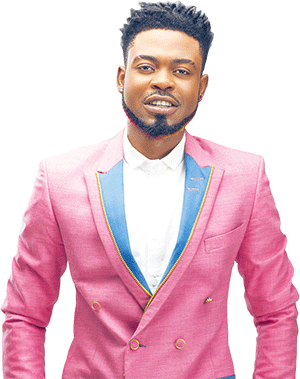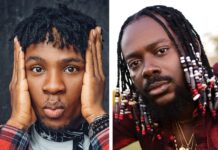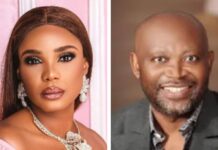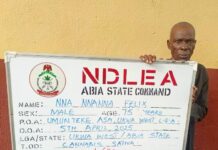Bernard Deker Chukwuka has two singles rocking the airwaves, ‘Onyenekwu’ and ‘Owo mi da’. The first also has a video to go with it. The up-and-coming artiste who goes by his middle name Deker talks about his journey to superstardom in this interview with Assistant Life Editor, TERH AGBEDEH.
Is Deker your real name?

Yes.
Is it Igbo?
It is a Hebrew name which means ‘piercing’ and that is what I do to music; I pierce music and put it on paper and on sound, so that people can listen to it. It is a good definition for my name.
Your music sounds like what Flavour is doing. What would you say is the difference?
The difference is my flow and the me that I am. I always say that I can’t be Phino, I can’t be Flavour, I can’t be anybody else. Everybody in the music industry has their different style, flow, energy and different ways of attacking beats when it comes to sounds. So that makes me different is the way I sing my songs. The way I carry myself makes me unique and different from other people.
You rap, sing and also dance
I am not a professional dancer, though when it comes to movement of the body and all that, I can shake my body.
In some of your songs, you start with “it’s Deker”; what informs this?
I have to start with introducing myself because those songs are my first singles. Apart from that, starting with my name is a way of creating this awareness that Dekar is onboard. It is the best way I can start.
Your songs contain English, Igbo and Yoruba words; are you fluent in all these languages?
The way I understand music; it is the food for the soul. You can sing music in any language in as long as you are feeding the soul. I happen to be opportuned to speak a little Yoruba. Igbo is my native language and every Nigerian speaks a bit of English, including pidgin.
What would you say you are bringing to the industry that will stand you out?
I am just trying to make sure that I am different. I am the kind of artiste that likes singing to different kinds of audiences. For people that are in the office, I give them the kind of song that they will enjoy when they are in the office. To people who want to party or dance; I give them the kind of song they can listen to when they are dancing. For ceremonies like weddings and all that, I give you the kind of song; so, I am just trying to bring different kinds of people together with my songs, you know, appealing to different kinds of people.
It sounds like that is what every musician is doing, appealing to different kinds of people. So it doesn’t look like something different. You are planning a video shoot?
I have already done a video.
For the two songs?
For the first, ‘Onyenekwu’.
Do you have women shaking their backsides to the rhythm?
(Laughing) No, it tells a story of a young man who left his hometown and has been out of there for a long time. He goes back and it is usually the kids that notice a newcomer in the village and then go on chasing after the visitor. Then the village people want to know what all the noise is about. It is like an exclamation, who is talking?
That sounds like your story.
Yeah, the normal story.
What sacrifice have you made to go into music; what are you leaving behind to go into music?
I made a lot of sacrifice in the sense that I have to displease the people that I should please in order to do music. Among the many things that I can do, music is the best that I can do. So, in order for me to do that, my best people like my parents never supported me. It is common for parents not to support their children who want to do music.
Has that not changed, considering that musicians are doing well?
Some people still don’t.
What would they have you do?
I don’t know, but I had to because this is what I want to do.
You haven’t said what your parents would have preferred you to do instead of music?
They wanted me to do stuff other than music.
How far did you go with your studies before you started music?
That is something I would like to keep to myself for now.
What do you want to share now?
I just want to talk about the music, my prospects and our projects with my record label.
So are you signed on to a record label?
Sure.
What is the duration of the contract?
Not too long, but quite a number of years (laughing).
What is the name of the record label?
Dihoo Records.
Are you the first artiste on Dihoo?
I am not just an artiste on Dihoo because of the relationship I have with the record label, so that makes the difference.
At what point did you decide that music is what you wanted to do?
Right from day one, I have always been this child that loved music; from the day I was born, because long before my dream of becoming a superstar, I had been singing. My parents still remind me of some of the songs I sang at a tender age.
So they liked it when you were singing at a tender age?
Sure. But they didn’t like it when I wanted to do it professionally.
Do you think that you have reached the point where you are going to be a superstar?
To me, I am a superstar because I have all it takes to be a superstar. We are just in the movement. Of course, every good thing comes by hard work; so, we are working and we will keep working.
If hard work is one of the things it takes to be a superstar, what are the others?
You need talent, which is very important. You need God most of all, and then you need good people around you to always wake you up when you are down, to always encourage you and tell you that you are the best. All these things are needed to be a superstar.
What inspired the song ‘Owo mi da’?
I have had this experience on the streets where you board a bus and conductors are fighting with some of the passengers and you hear comments like Owo mi da?
One would think the song is about the touts that collect money from bus drivers?
They do that too. You hear ‘agberos’ at the bus stops shouting owo mi da? when buses approach. So that was how I got the inspiration for the song. Apart from that, even a businessman doing his business, I mean, nobody wants to do anything for free, especially when it comes to business. So ‘Owo mi da?’ is a way of asking for the money after the job is done.
What message will people who listen to these two songs you have just released take away?
First of all, I am trying to remind people about what goes on in the streets. Sometime ago, I came in contact with an agbero and he took my stuff from me and ran off. These are the kinds of things that go on in the streets. So I am just trying to pass the message to people that this is what happens in the streets; this is how it is done. So better be awake in the streets, so you don’t get robbed. Basically, it is to tell people that they need to open their eyes, like they say, ‘shine your eyes’.
Have you been performing shows?
Recently, we did Industry Night. There is another one coming up this Friday at the Nigeria Institute of Journalism (NIJ). I have also performed at the Africa Shrine.














